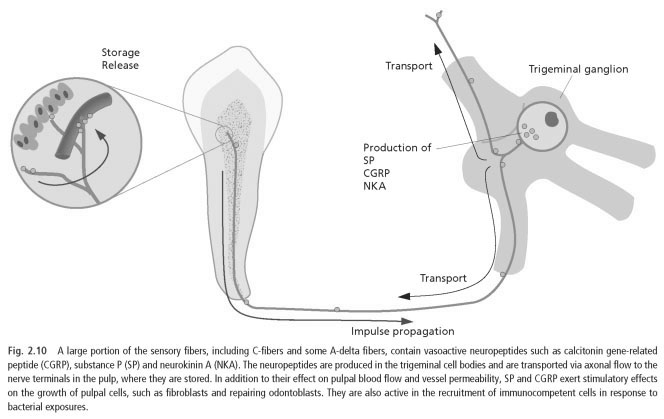Nerves
The pulp of a tooth nerves control the pain. Due to its peptide content they also play important functions in inflammatory events and subsequent recovery of tissues (Fig. 2.10). Furthermore, they control the dentin formation (Fig. 2.10).
There are two types of nerve fibers that transmit pain:-fiber to conduct rapid and sharp pains and belong to the myelinated group, while the C-fibers are involved in a dull aching pain and thinner, and unmyelinated.-fiber, mainly Delta type, mainly located in the periphery of the flesh, where they are in close contact with the odontoblasts and expand fibers for many, but not all the dentinal tubules. C-fibers, usually finishes in the pulp tissue correct, or as the free nerve endings or as branches around blood vessels (56). Character - and C-fibers and their role in pain transmission are described in Chapter 4.
Nerves belonging to the autonomic nervous system, such as the sympathetic vasoconstrictor fibers are also present (48). They are flesh, blood vessels and organs of axons.
Histochemically, they can be traced back in the pulp through their content of norepinephrine and neuropeptide Y. After the release of these substances as a result of the reduction of smooth muscles of the sphincter of the small arteries and arterioles apical and within cellulose (58).
Both sensory and sympathetic nerves to stimulate dentin education as evidenced by the decrease dentin formation in the absence of sensitive nerves and after sympathectomy, respectively (32). Sensory and sympathetic nerves also interact with inflammation of the pulp of the tooth. For example, untouched innervation is essential for the recruitment and activation of the cells of the immune system (see literature 2.1).
While there is little evidence that parasympathetic vasodilator blood flow control plays an important role in local functions and defense cellulose.

Key literature 2.1
Based on experimental studies Haug and Heyeraas (25) suggested that immune responses are modulation of the sympathetic nervous system (SNS) in the tissues of the teeth. SNS has been shown to inhibit the production of proinflammatory cytokines, while stimulate the production of inflammatory cytokines. Rats dental tissues, it was found that SNS is essential for the recruitment of inflammatory cells, such as CD-43+ granulocytes. Sympathetic nerves seemed to have an inhibitory effect on osteoclasts, odontoclasts, and IL-1-alpha production. SNS stimulated reparative dentin production because of reparative dentin formation was reduced after sympathectomy. The germination of the sympathetic nerve fibers is a chronic inflammation of the pulp of the tooth, and neural imbalances from unilateral sympathectomy recruits immunoglobulin-producing cells in rats dental pulp. In conclusion, the article presents evidence in support of interaction between the sympathetic nervous system and cells producing hard tissue and inflammation of the pulp of the tooth. ..